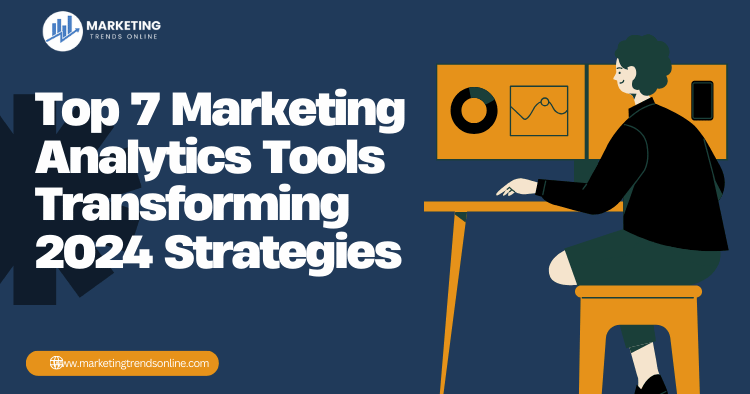Table of Contents
- Introduction
- 1. Google Analytics 4
- 2. HubSpot Analytics
- 3. Tableau
- 4. Adobe Analytics
- 5. SEMrush
- 6. Hotjar
- 7. Mixpanel
- Conclusion
- FAQs
Introduction
The digital landscape is evolving at an unprecedented pace, and as we step into 2024, marketing analytics tools are becoming more essential than ever. These tools help businesses make data-driven decisions, optimize their marketing strategies, and ultimately drive better results. With an increasing focus on customer experience and targeted marketing, businesses are turning to advanced analytics tools to stay ahead of the competition. In this article, we’ll explore seven marketing analytics tools that are transforming strategies in 2024.
1. Google Analytics 4
Google Analytics 4 (GA4) is the latest iteration of Google’s flagship analytics tool, and it’s a game-changer for marketers. Unlike its predecessor, GA4 focuses on the user journey across devices and platforms, providing a more holistic view of customer interactions.
Key Features:
- Event-Driven Data Model: GA4 utilizes an event-driven model that allows marketers to track specific user actions, such as clicks and page views, more effectively.
- Cross-Platform Tracking: With GA4, you can track user interactions across websites and apps, giving you a complete picture of the customer journey.
- Enhanced Privacy Controls: The tool offers improved privacy features, compliant with regulations like GDPR, making it easier to manage user data responsibly.
As businesses face increasing scrutiny over data privacy, GA4 equips marketers with the tools needed to navigate these challenges while still gaining valuable insights.
Learn more about Google Analytics 4 here
2. HubSpot Analytics
HubSpot Analytics is a powerful tool that integrates seamlessly into HubSpot’s CRM and marketing platform. It provides comprehensive insights into marketing campaigns, lead generation, and customer behavior.
Key Features:
- Dashboards & Reporting: Customizable dashboards allow marketers to visualize data in a way that suits their needs.
- Attribution Reporting: HubSpot excels in multi-touch attribution, helping businesses understand which marketing channels are driving conversions.
- Integration with Other Tools: HubSpot connects with various third-party tools, ensuring a unified approach to marketing analytics.
HubSpot Analytics simplifies the process of tracking and interpreting data, making it accessible for marketers of all skill levels.
3. Tableau
Tableau is a leading data visualization tool that transforms complex data sets into easy-to-understand visual representations. This tool is particularly useful for businesses that need to analyze large volumes of data from various sources.
Key Features:
- Interactive Dashboards: Users can create interactive dashboards that allow for real-time data exploration.
- Data Blending: Tableau can pull data from multiple sources, whether it’s spreadsheets, databases, or cloud services, enabling comprehensive analysis.
- Predictive Analytics: Built-in predictive capabilities help businesses forecast trends and make proactive decisions.
In an age where data is abundant, Tableau helps marketers distill that data into actionable insights, driving strategic decisions.
Explore Tableau’s capabilities.
4. Adobe Analytics
Adobe Analytics is a robust tool designed for enterprises looking for in-depth insights into customer behavior and marketing performance. It’s part of the Adobe Experience Cloud, allowing for seamless integration with other Adobe products.
Key Features:
- Real-Time Data Processing: Adobe Analytics processes data in real-time, enabling marketers to make informed decisions quickly.
- Advanced Segmentation: Users can create highly specific segments to analyze distinct customer behaviors.
- Integration with Adobe Experience Cloud: This integration allows for a comprehensive view of customer interactions across all touchpoints.
For larger organizations that require detailed analysis and reporting, Adobe Analytics provides the depth and breadth necessary to inform marketing strategies.
Discover more about Adobe Analytics.
5. SEMrush
SEMrush is primarily known as an SEO tool, but its analytics features are invaluable for marketers looking to enhance their online presence. It provides insights into website performance, keyword rankings, and competitor analysis.
Key Features:
- SEO Analytics: Provides insights into organic search performance and keyword optimization.
- Traffic Analysis: Offers comprehensive data on website traffic, including sources and user behavior.
- Competitor Research: Users can analyze competitor strategies to identify opportunities for growth.
In the competitive landscape of digital marketing, SEMrush equips marketers with the tools to refine their strategies and outperform rivals.
6. Hotjar
Hotjar is a user behavior analytics tool that provides insights into how users interact with your website. It combines analytics and feedback tools to help businesses optimize their user experience.
Key Features:
- Heatmaps: Visual representations of user interactions on your site, showing where users click, scroll, and spend time.
- Session Recordings: Playbacks of user sessions to observe actual behavior and identify potential issues.
- Surveys and Feedback: Tools for collecting user feedback directly, allowing for real-time adjustments to enhance user experience.
Understanding user behavior is crucial for optimizing marketing strategies, and Hotjar provides the insights needed to enhance website performance and user satisfaction.
7. Mixpanel
Mixpanel is a product analytics tool that focuses on tracking user engagement and retention. It’s particularly useful for tech and SaaS companies looking to understand user interactions with their products.
Key Features:
- Cohort Analysis: Allows businesses to segment users based on behavior, making it easier to understand how different groups interact with your product.
- Funnel Analysis: Visualize user pathways to identify bottlenecks in conversion processes.
- Retention Reports: Track how often users return to your product, providing insights into customer loyalty.
For businesses that rely heavily on product engagement, Mixpanel offers the tools necessary to analyze user behavior and drive retention strategies.
Conclusion
As we move into 2024, marketing analytics tools continue to evolve, providing businesses with the insights they need to thrive in a competitive landscape. From understanding user behavior to optimizing marketing campaigns, these tools are transforming strategies and driving better results. By leveraging these analytics capabilities, marketers can make informed decisions, enhance customer experiences, and ultimately drive growth.
FAQs
1. What are marketing analytics tools?
Marketing analytics tools are software applications that help businesses collect, analyze, and interpret data related to their marketing efforts. They provide insights into customer behavior, campaign performance, and market trends.
Marketing analytics is crucial because it allows businesses to make data-driven decisions, optimize their marketing strategies, and measure the effectiveness of their campaigns. This leads to better ROI and improved customer experiences.
2. Why is marketing analytics important?
Marketing analytics is crucial because it allows businesses to make data-driven decisions, optimize their marketing strategies, and measure the effectiveness of their campaigns. This leads to better ROI and improved customer experiences.
3. Can small businesses benefit from marketing analytics tools?
Absolutely! Marketing analytics tools can provide valuable insights for businesses of all sizes. Many tools offer scalable solutions that can grow with your business.
4. How do I choose the right marketing analytics tool?
Consider factors such as your business size, marketing goals, budget, and the specific features you need. It’s often helpful to take advantage of free trials to test different tools before making a decision.
Yes, several marketing analytics tools offer free versions or trials, such as Google Analytics and HubSpot. These can be a great starting point for businesses looking to dive into data analysis without a significant investment.
5. Are there free marketing analytics tools available?
Yes, several marketing analytics tools offer free versions or trials, such as Google Analytics and HubSpot. These can be a great starting point for businesses looking to dive into data analysis without a significant investment.
Also look for:
For further insights into marketing strategies and analytics, consider exploring these articles on top content marketing tools for 2024, data-driven content marketing trends and email marketing analytics trends.




